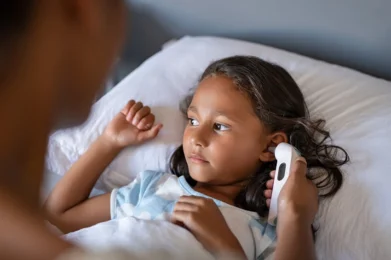In This Article:
- More than 20% of children in the U.S. have a mental health disorder. COVID-19, environmental stressors and social media are the main mental illness causes for kids and teens.
- Pay attention to the warning signs of children’s behavioral health disorders, such as isolation, crying, changes in grades, sleeping patterns and activities.
- Treatment methods for children who are struggling include therapy, medication and integrated behavioral health services.
Mental Illness Causes in Children
COVID-19
The shared trauma of COVID-19 has had a drastic impact on the overall well-being of children — and everyone has been affected differently. Some kids, such as introverts or those who were being bullied, have preferred learning at home. Extroverted students who enjoyed coming to school and seeing their friends have suffered from a social standpoint. Children with learning disabilities and ADHD had to adapt to not having the same accommodations at home as they did at school.
Environmental Stressors
Mental health can also be influenced by situational factors. Children who have chronic illnesses, for example, may become depressed from spending time in the hospital. Similarly, children notice psychological stressors at home. They can sense relationship and financial struggles and may feel helpless knowing they cannot improve the situation. Undocumented families in our community are also afraid of seeking services or medical help due to their status, which can negatively influence a child’s mental health.
Social Media
In the digital age, children and teens constantly compare themselves to others. This can harm their confidence. Too much time spent on social media may lead to depression, as well as self-image-related problems like body dysmorphia and eating disorders. Consider limiting your child’s screen time and assuring them that the images they see from their favorite influencers are usually not reflective of real life.
Warning Signs of Mental Illness in Children
It all comes down to trusting your gut, but a typical initial warning sign is a sudden shift in behavior. Look for indications of the following changes:
- Isolating and talking less
- Crying more than usual
- Changes in grades
- Changes in sleeping patterns
- A lack of enjoyment for the activities they once loved
How Are Children’s Behavioral Health Disorders Diagnosed?
First, doctors must find the underlying issue that requires treatment. The most common mental health disorders in children and teens are:
- Anxiety Disorders – separation, social, general or another subset
- Depression
- ADHD and other learning disabilities
Your child will need to complete a comprehensive evaluation by a professional mental health provider or physician. You may be able to start with your primary care provider, then be referred to Integrated Behavioral Health (IBH) at Valleywise Health.
We will talk to family members first, then speak with your child to get their perspective. We prefer to meet with them alone at some point during the evaluation, because some children feel more comfortable telling certain things to a doctor than they would their parents. This helps us form a more accurate diagnosis.
Then, we rate your child on a numerical scale to get an objective measure of symptoms that helps us recommend the treatment they need.
How Are Children’s Behavioral Health Disorders Treated?
Treatment most commonly comes in the form of traditional talk therapy, which uses psychiatry to teach children the long-term coping skills they need to be successful. If therapy alone is not enough, your child may be prescribed medication. Doctors will start at the lowest possible dose and very carefully monitor side effects to avoid any harmful outcomes. While many parents are hesitant to start their children on medications, it may be the only way to help your child feel better. Just like we need medicine for physical conditions, the brain also requires a little extra help sometimes.
Integrated Behavioral Health
Another great treatment option is integrated behavioral health, which addresses mental and physical health problems simultaneously. By focusing on whole-person health care, we can create a well-rounded plan for your child that allows them to thrive in any environment.
What You Can Do as a Parent
It can be difficult to see your child struggle, but with the right approach, you can be a crucial part of their improvement. Here are some expert tips on how to deal with a child who has a mental illness:
- Offer help, but don’t intervene or rush your child. Give them space and let them know you are available to talk any time. Make them come to you first, and you will get more information.
- Let them vent to you without invalidating their struggles. Never say “It could be worse” or “In 10 years, none of this will matter.” It matters to them now, and their feelings are valid.
- Don’t make it about you. However, if you have also struggled with mental illness, you can relate to them with similar circumstances to make them feel less alone.
- Mean what you say. Don’t tell your child they won’t get in trouble, then ground them for what they told you after they work up the courage to share. This breaks a barrier of trust.
- Make observations about their behavior, rather than pointed questions that demand an answer.
- Check in with your children often. If they are used to being in touch with their feelings on a regular basis, they will feel less on the spot when larger issues arise.
- Remember that kids are constantly evolving. What they like today may not be what they like tomorrow. They’re going to struggle and make mistakes in the process of discovering who they are. So, set limits but allow them to figure out who they want to be on their terms.
If you actively watch for mental illness causes and warning signs in your child and create a safe space for them to share how they feel, it will be easier to get them the diagnosis and treatment they need.
SOURCES:
- https://www.cdc.gov/childrensmentalhealth/symptoms.html
- https://www.cdc.gov/childrensmentalhealth/data.html#:~:text=1%20in%206%20U.S.%20children,%2C%20behavioral%2C%20or%20developmental%20disorder.
- https://www.nimh.nih.gov/health/publications/children-and-mental-health/
- https://valleywisehealth.org/services/behavioral-health/integrated-behavioral-health-and-whole-health-care/








